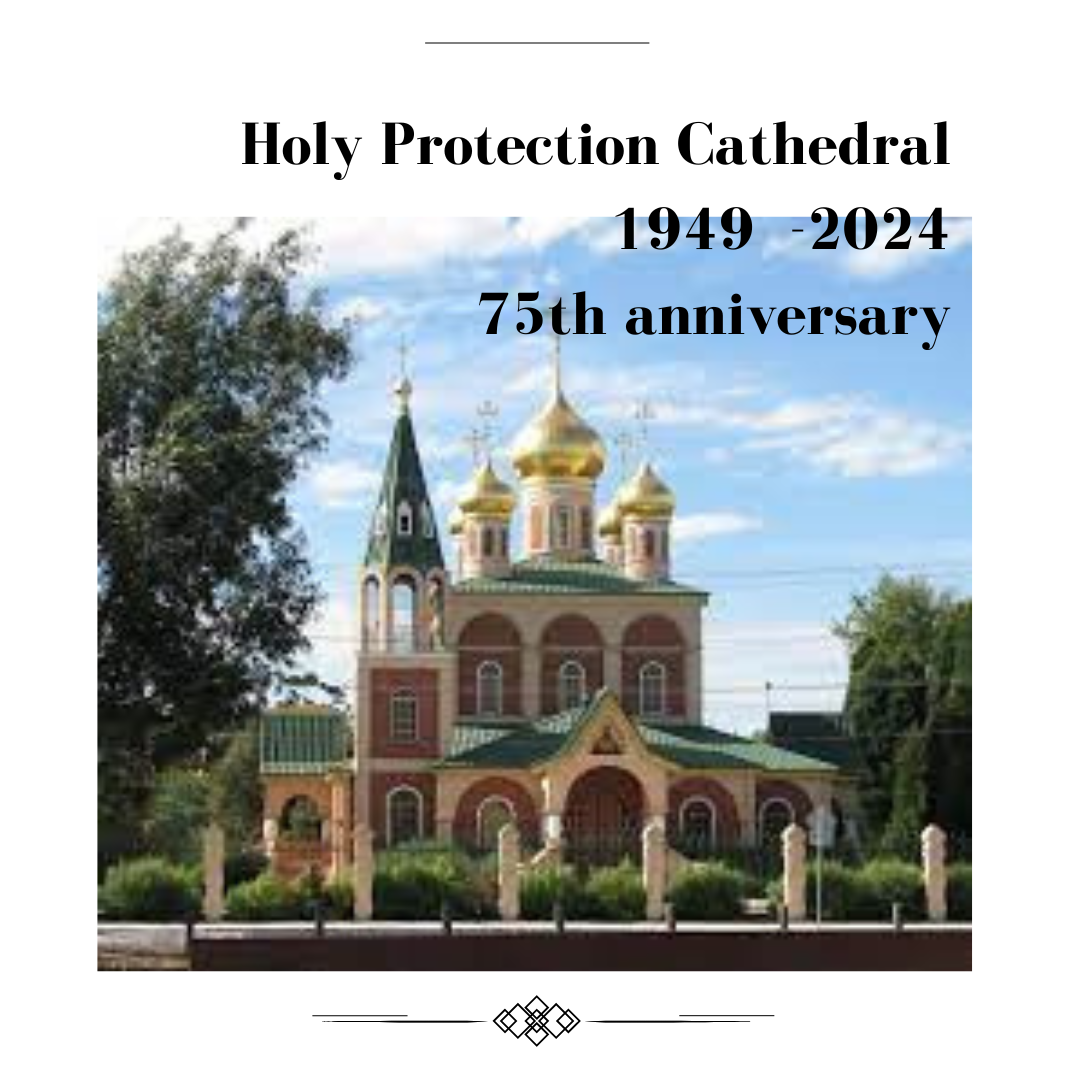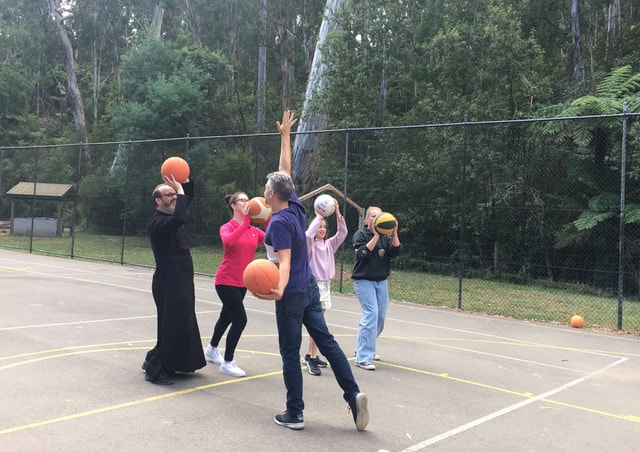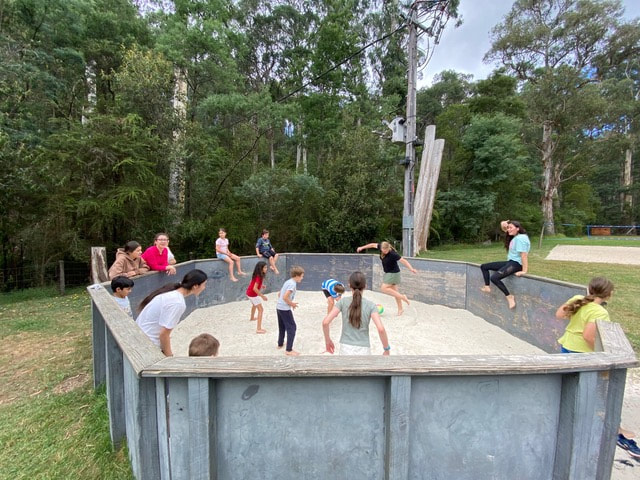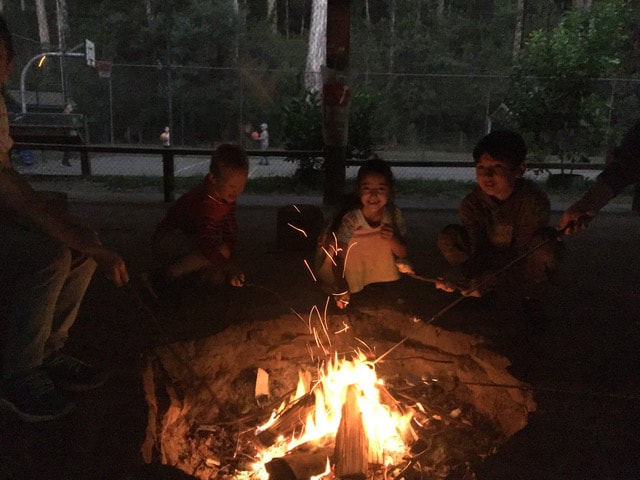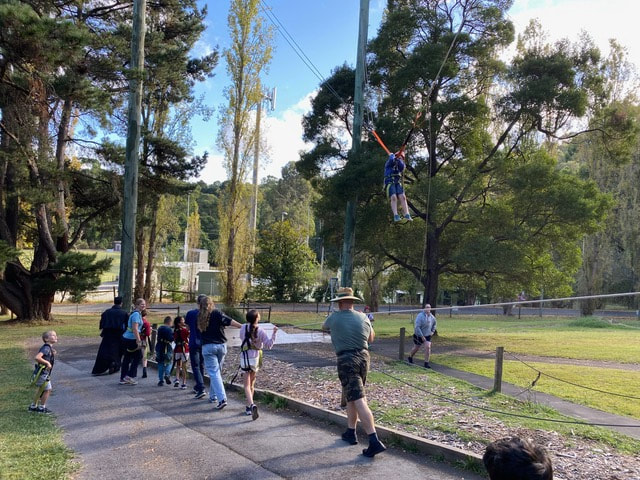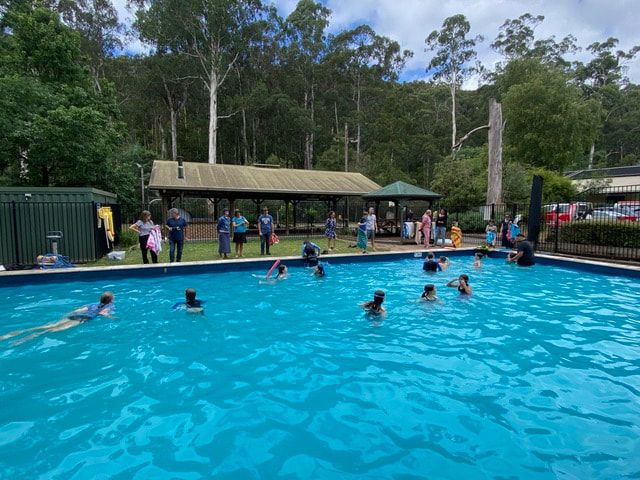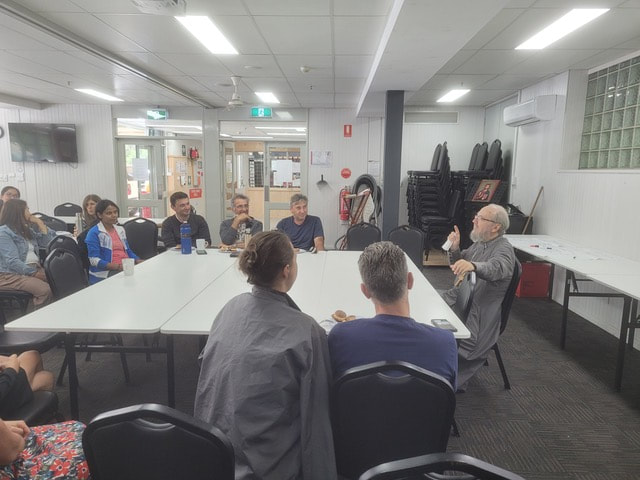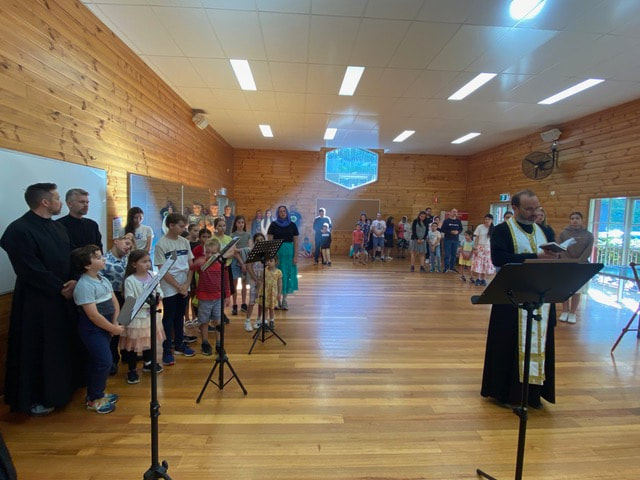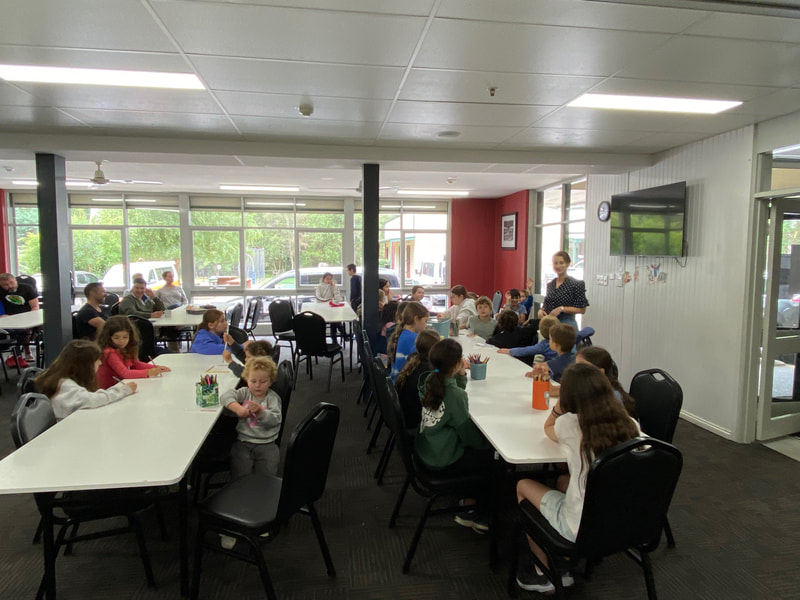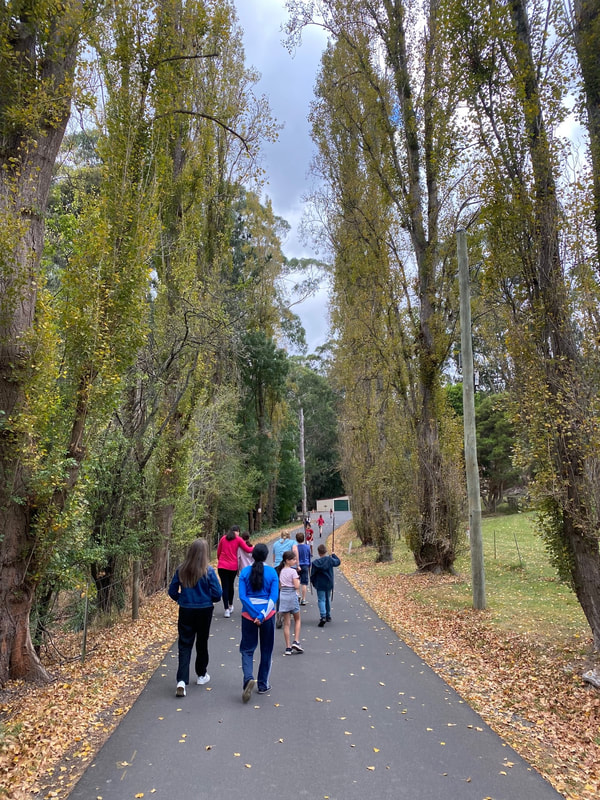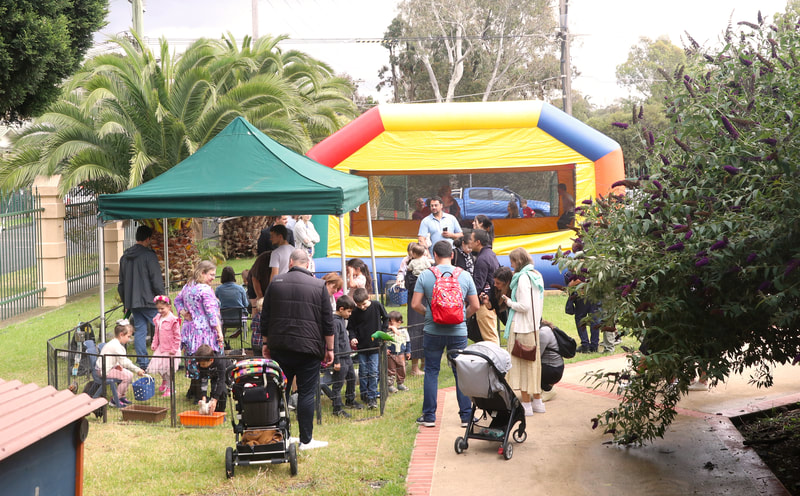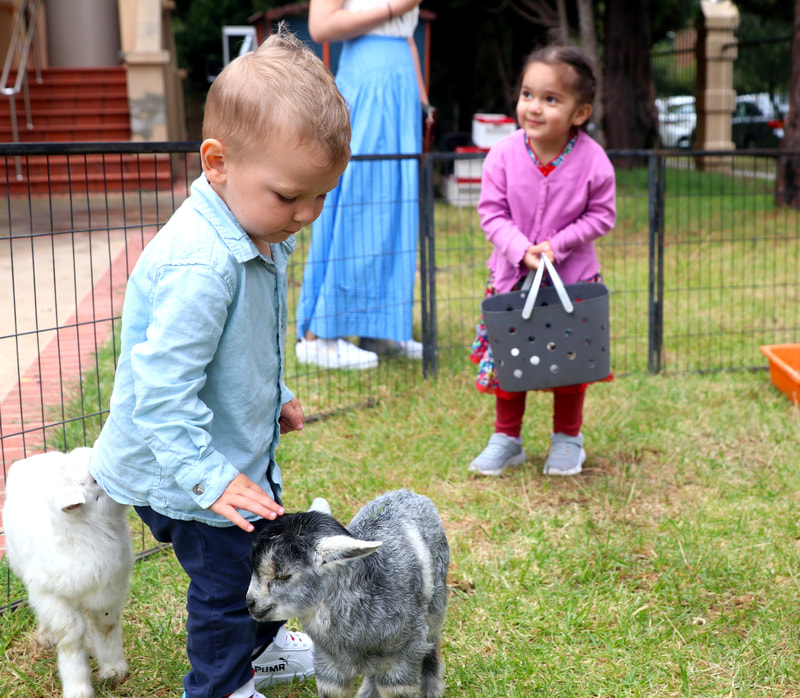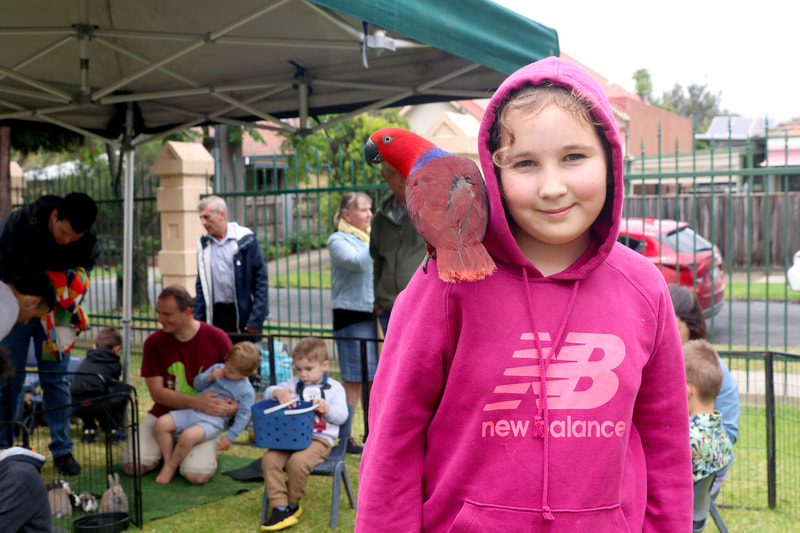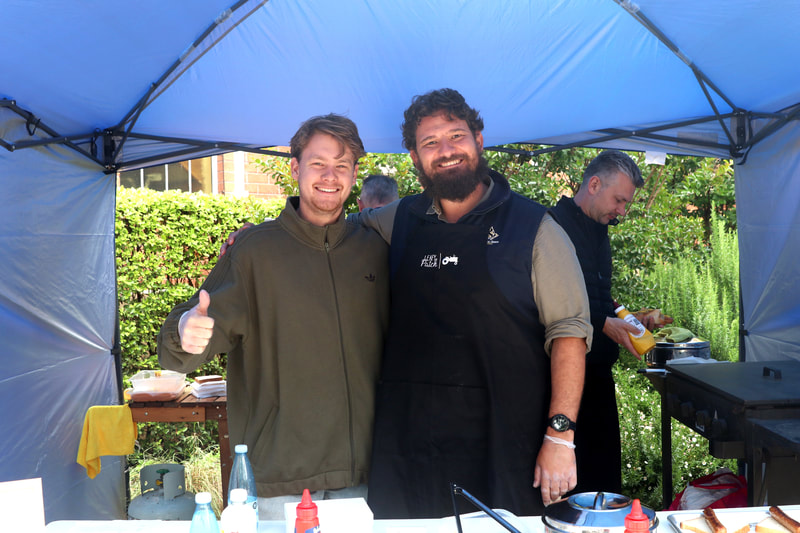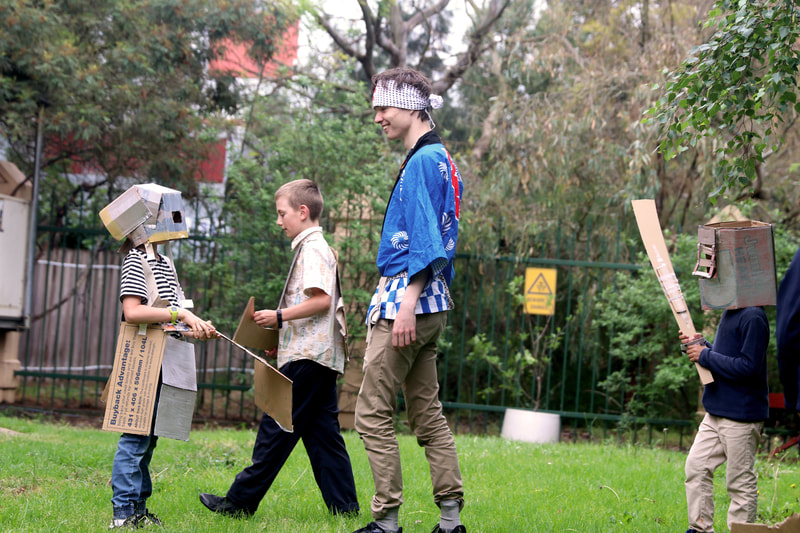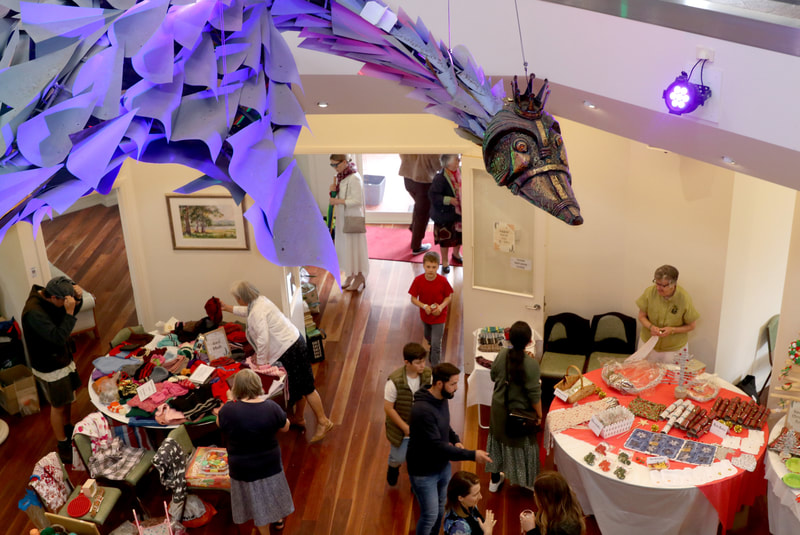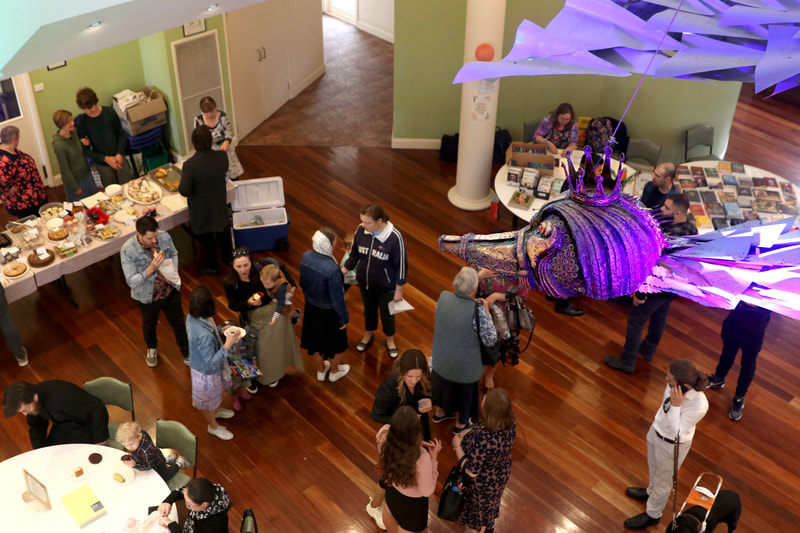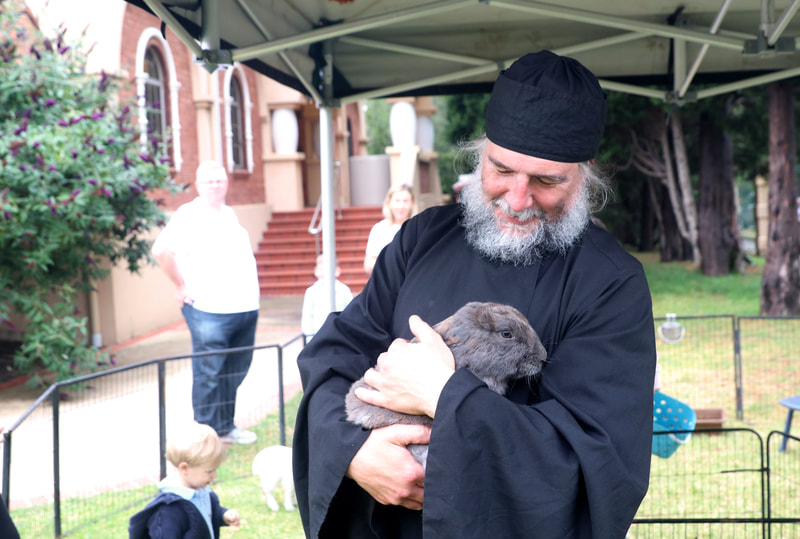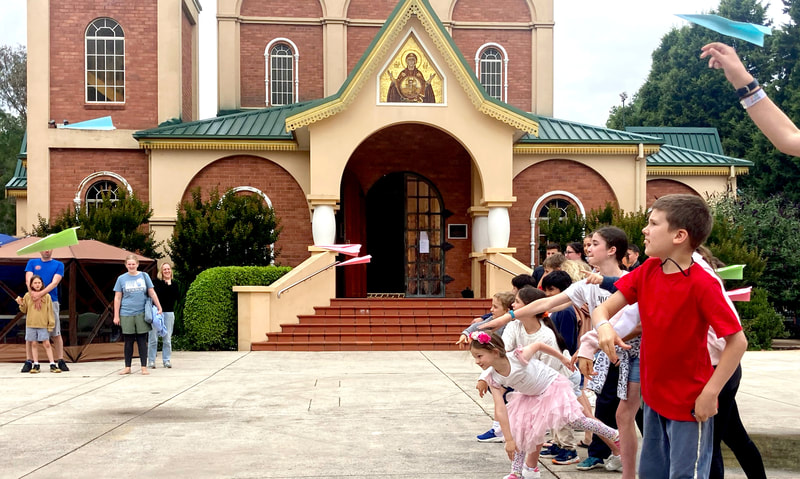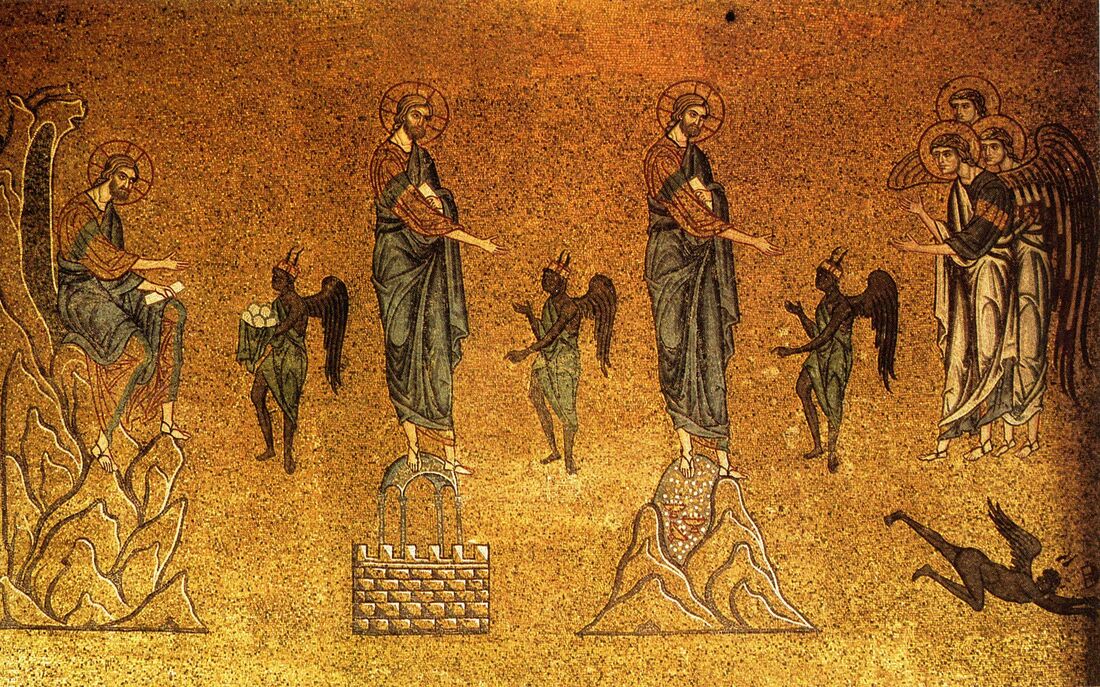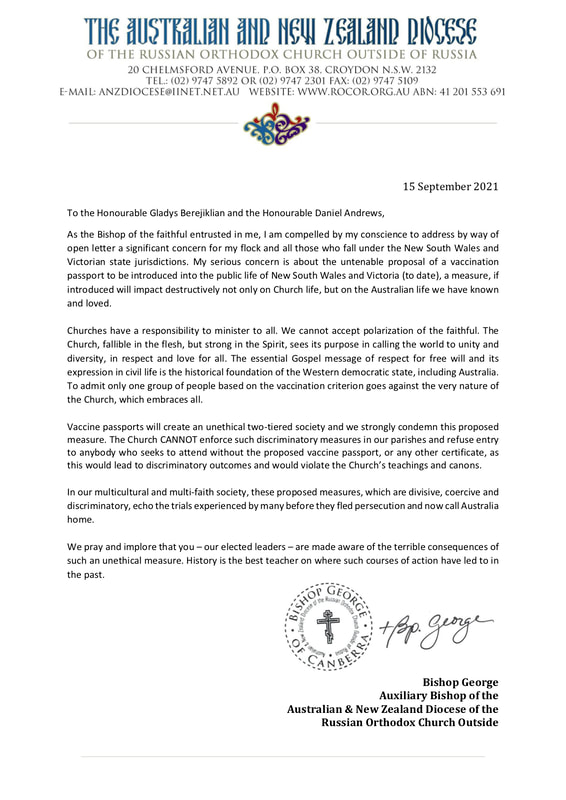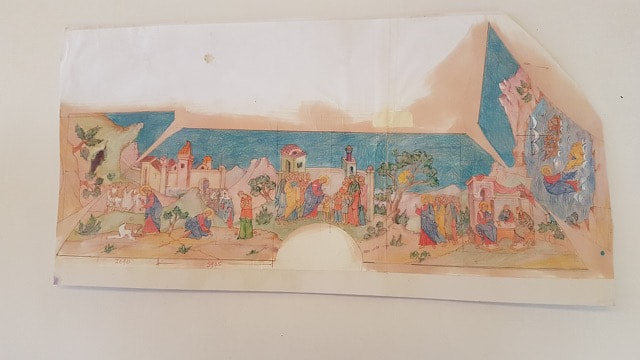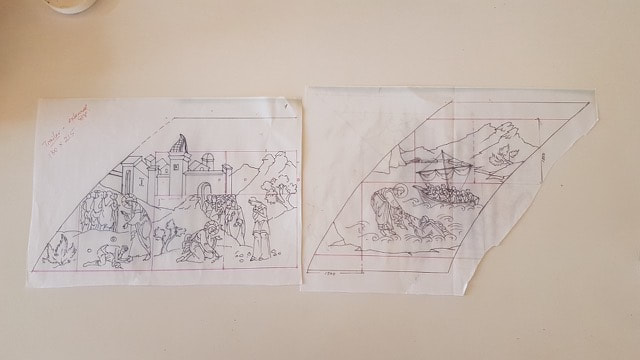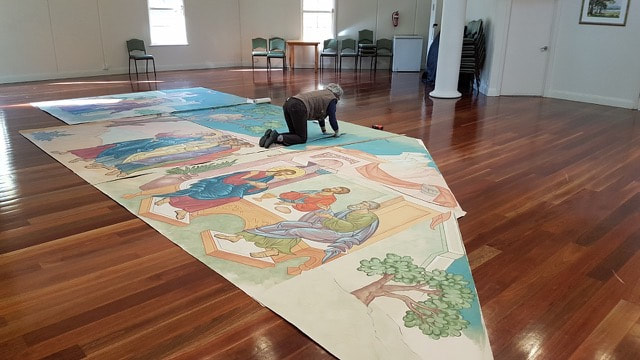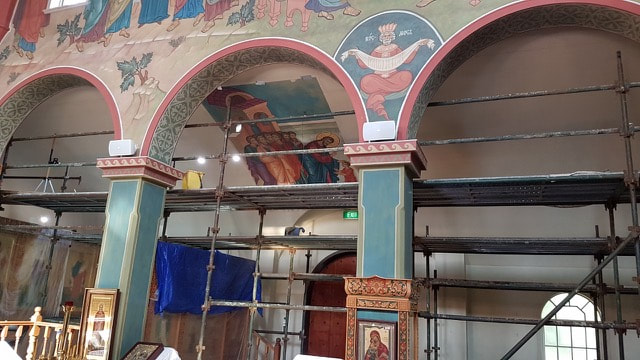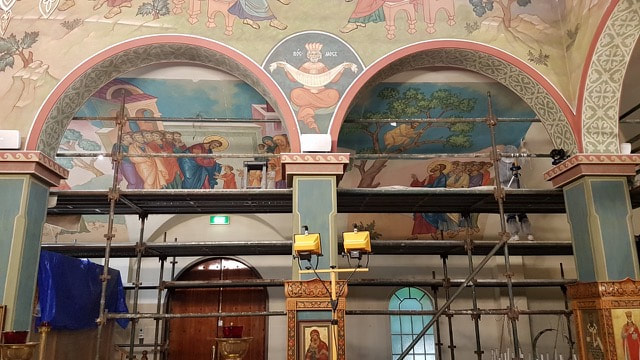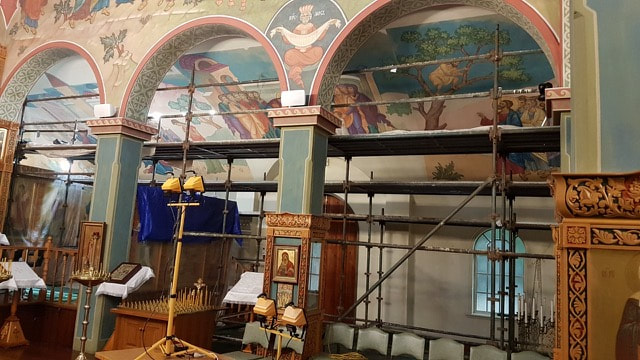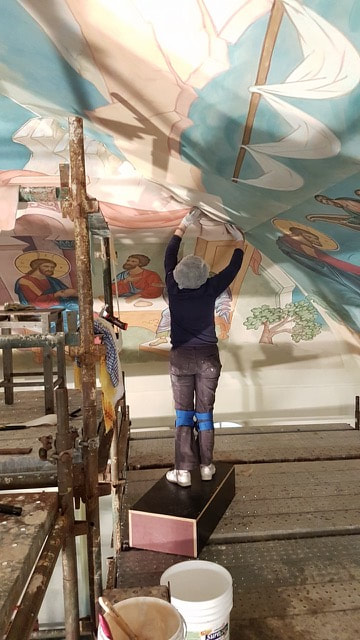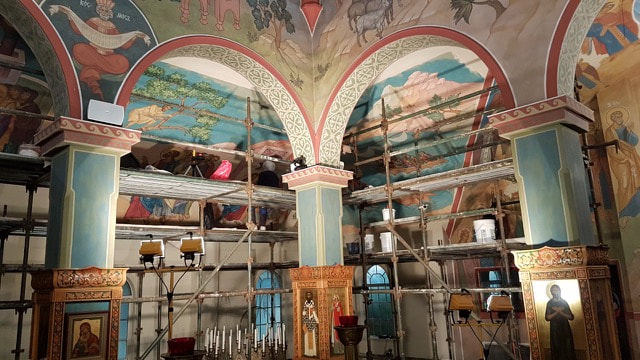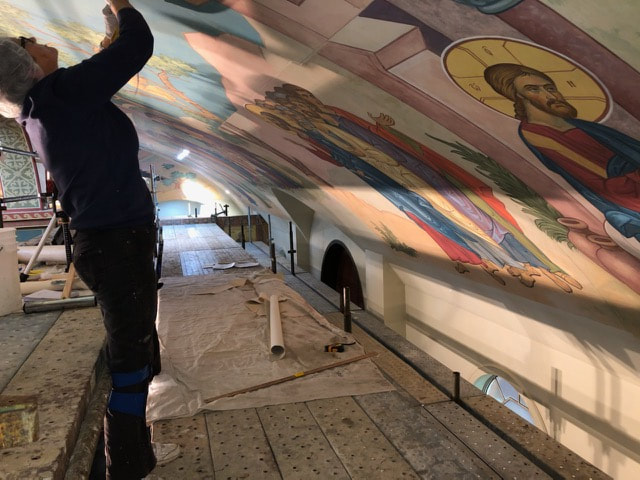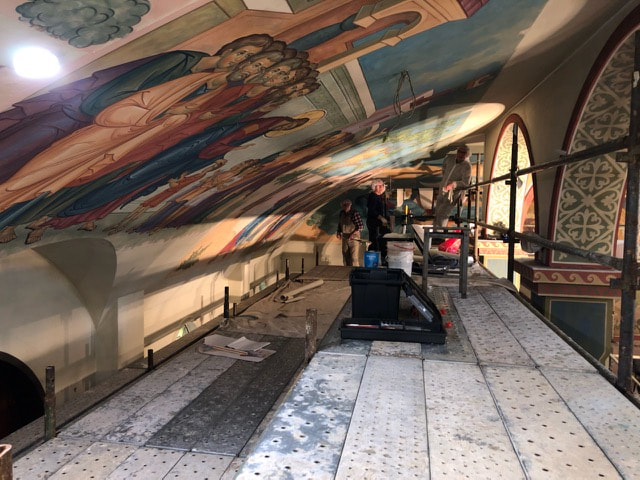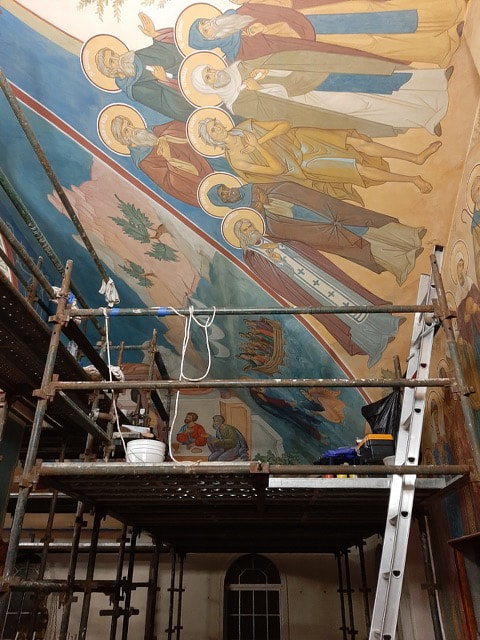|
Our deacon Fr Alexander has just come back from a massive solo bike ride from Melbourne to Sydney. The trip took ten days, averaging over 110km per day. The aim? Fr Alex is raising money for the charity, The Fathering Project. This organisation is dedicated to helping fathers across Australia be the best they can, to prevent long-term social, emotional and cognitive difficulties and create the conditions for children to thrive. Healthy families are the building blocks of a healthy society. Fr Alex has been working in the community services field for over thirty years, and began work with this organisation three years ago.
In 2022 Fr Alex took a group of thirty-five men and climbed Mt Kosciuszko, the highest peak in Australia. Having now completed his epic bike ride, we look forward with great interest to hearing about his next adventure... You can still donate here: https://gofund.me/17b1eba8 К празднованию Светлой Пасхи 5 мая 2024 г. Сестричество Покровского Собора в Мельбурне, принимает заказы на куличи и сырные пасхи. Все можно хранить в морозильной камере. Звонить старшей сестре Luba Cowall, по телефону. 0411 090 550
In celebration of Easter Sunday 5 May, 2024 The sisterhood of the Pokrov Cathedral in Melbourne are taking orders for Kulichi and sweet cheese paska. These products can be kept in the freezer. Please phone Head Sister on 0411 090 550 We will be celebrating our 75th anniversary Patronal Feast on October 20, 2024 with a luncheon held at church following the Liturgy. More information and ticket sales coming soon!
(The actual feast of the Protection of the Mother of God falls on Monday this year - October 14 - so the celebration will be held the following Sunday in order for parishioners to attend) Our annual Parish Fete is a chance for the parish community and our neighbours to enjoy some family-friendly entertainment and some great food! 2024 marks the 75th anniversary of our parish, and our Patronal Feast in October will be a grand celebration... so the fete might not happen this year!
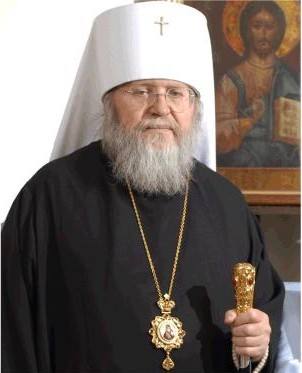 Christ is risen! It is with great sadness that we learnt that Metropolitan Hilarion, our diocesan ruling bishop since 1996 and later, first hierarch of the the Russian Orthodox Church Outside Russia, passed away this morning (Australian time). We will serve a panikhida tonight after vespers. Vespers at 6pm, panikhida at 6.45pm. Memory eternal! 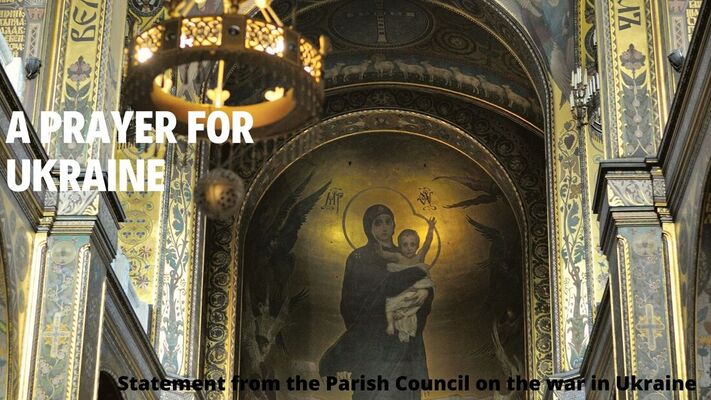 Prayer for Ukraine Lord Jesus Christ our God, look down with Thy merciful eye upon the sorrow and greatly painful cry of Thy children, abiding in the Ukrainian land. Deliver Thy people from strife, make to cease the spilling of blood, and turn back the misfortunes set against them. Lead unto sanctuary those bereft of shelter, feed the hungry, comfort those who weep, and unite the divided. Leave not Thine own flock, who abide in sorrows on account of their kinsmen, to diminish, but rather, as Thou art benevolent, give speedy reconciliation. Soften the hearts of the unmerciful and convert them to the knowledge of Thee. Grant peace to Thy Church and to Her children, that with one heart and one mouth we may glorify Thee, our Lord and Saviour, unto the ages of ages. Amen. Metropolitan Onuphry of the Orthodox Church in Ukraine “Defending the sovereignty and integrity of Ukraine, we appeal to the President of Russia and ask him to immediately stop the fratricidal war. The Ukrainian and Russian peoples came out of the Dnieper baptismal font, and the war between these peoples is a repetition of the sin of Cain, who out of envy killed his own brother. Such a war is not justified either by God or by people.” ‘This is not right’: Melbourne’s Russians decry Putin’s invasion , The Age, 25 February 2022 "Like many people of Russian descent living in Australia, Nicholas Karipoff, Archpriest of the Russian Orthodox Church in Melbourne, believes President Vladimir Putin’s decision to invade Ukraine is both unexpected and deeply upsetting. “We pray for the suffering land of Ukraine in our church,” he told The Age. “They are people who are very close to us. We have Ukrainian families in our church.” " The Parish Council of Protection Cathedral would like to publicly express the following: 1. Our dismay at the war in Ukraine. 2. Our acknowledgement of the anguish caused to our Ukrainian brothers and sisters, both there and here in Australia. 3. Our wish that our churches locally, nationally and internationally will do all they can to urge the end of hostilities. “Blessed are the peacemakers, for they will be called children of God” (Matthew 5:9)" 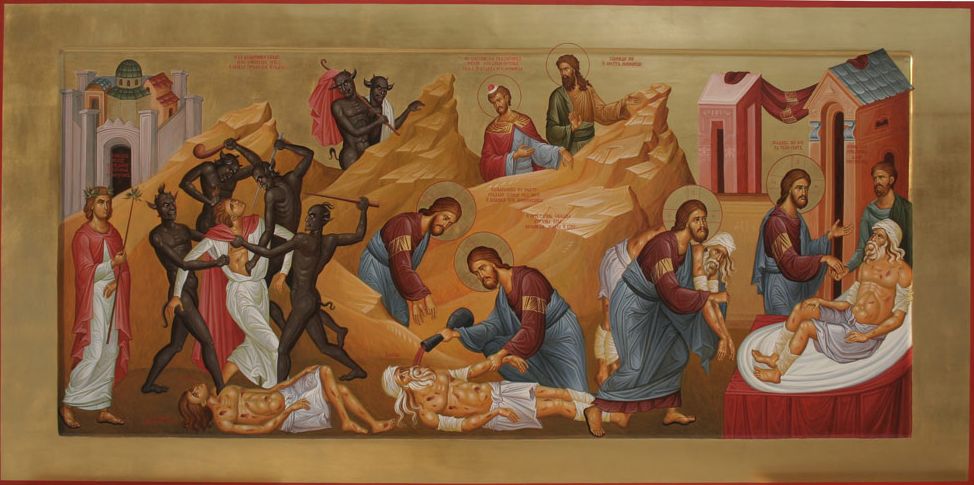 Sermon by Fr Nicholas Karipoff
Luke 10: 25 – 37 The Good Samaritan In the name of the Father, and of the Son, and of the Holy Spirit In today’s reading, the lawyer, a specialist in the law of Moses, asked Jesus Christ how one can obtain eternal life. He had heard about Christ’s teaching, and he correctly answered the question about the Law posed to him by Christ - that the Law, the way to eternal life, is about love of God and love of our neighbour. However, what the lawyer did not understand was the nature of love. What is love? Therefore, he asked, ‘Who is my neighbour?’ In other words, who is worthy to be loved by me? Who is worthy of my love? In response, the Lord tells a very moving story, the Parable of the Good Samaritan. Christ is the Good Samaritan. Those Jews who did not believe in Him despised Samaritans. Galilee was just north of Samaria, so they called him a Samaritan as an insult. Christ uses the word differently. He’s the Good Samaritan who came to heal us – who are the half-dead descendants of Adam – in a spiritual sense. The parable, however, answers the lawyer’s questions in a very unexpected way. Rather than explaining to us. together with the lawyer, who our neighbour is, Christ describes how to become a neighbour to everybody. Or, at the very least, how to become a neighbour to those people in need of healing who God sends to us. Yes, it begins with those who speak directly to our conscience. And where does it end? The saints, as we find out from their lives and their writings, were able to encompass the whole world with their love, with their prayer. Oh, how the world today needs this sort of love, this sort of prayer, and the healing that it brings! Now patristic exegesis – which means interpretation of scripture – the exegesis of this parable tells us of the man descending from Jerusalem to Jericho. Anyone who’s been to the Holy Land knows that Jerusalem is up in the high hills, in a mountainous area, and Jericho is in the lowest depression on earth, 400m below sea level. It is a very steep descent between the two, over a short distance. The man who is walking from Jerusalem to Jericho represents the spiritual descent, on the way from closeness to God to disconnect from Him. The man is beaten up, just as the whole of humanity is beaten up by the demons. This happens historically, whenever there is this spiritual descent taking humanity from the high spiritual state of Jerusalem to the low spiritual state represented by Jericho. I would venture to say that apart from Noah’s day, there has never been a time in spiritual terms as low as the times we are living in today. Humanity is so badly beaten up with the current crisis. According to the Holy Fathers, the priest and the Levite who walked past the man, lying beaten up on the road, represent the law. The law was unable to heal humanity. The Good Samaritan, Christ, had to come. The law and its righteousness was futile and empty. The modern world has also developed its own ideology that is full of religious fervour. But the righteousness of today’s law also cannot heal humanity. The Church is represented by the inn in the parable, to which the Good Samaritan took the beaten-up man. Can the church continue to care for humanity? Can it continue its healing work? Perhaps the invisible bandits have now turned on the church to give up humanity, to give up this beaten-up man, to destroy him completely. Perhaps it is time for the Good Samaritan to come back as he promised the innkeeper, Look after him until I come back. That’s of course, the Second Coming. These are questions not only for our time. The Church in the early centuries was faced with the same questions. During the first and second centuries, and into the third century, it could not see a future for the world. The Church could not see any future for the world. And it was looking forward to Christ’s Coming. Yea Come O Lord Jesus. That was the feeling within the Church. And yet, the Church then overcame the world, just as Christ said to his disciples at the Mystical Supper; that in the world you will have sorrows but be of good cheer. Be daring. For I have vanquished, defeated, the world. And the Church then defeated the world, and the world came to the Church. The iron empire of the Romans became, well at least externally, a Christian empire. It could happen again if we truly want it to happen. It can only happen, however, if the Church - the physician - heals itself. Let’s seriously seek healing from the Good Samaritan. He can do it! Amen. Luke 8: 41 – 56 – Jairus’ daughter is raised, a woman is healed Luke 10: 16 – 21 – the Apostles cast out demons In the name of the Father, and of the Son, and of the Holy Spirit. Today’s two readings enable a contemplation of the huge problem, which is called theodicy. This word was coined in 1710 by the great European scientist and religious philosopher, Leibniz. This word, which he invented, means justification of God for why evil and suffering occur in the world. The first reading today, the Sunday reading, gives us the story of the woman who had an issue of blood for twelve years, and Jairus, the leader of the synagogue, whose daughter was dying. While Christ was on His way to heal the daughter, He was held up by the woman, and the daughter of Jairus died and was then raised by Jesus Christ. The second reading today was for St Michael the Archangel and the other Bodiless Powers in which we hear the apostles coming back joyfully from their missions, saying even the demons obeyed them, and Christ saying that He saw the fall of Satan from heaven. The problem of theodicy, or rather the failure to understand the problem as much as is possible with the mind and the heart, causes people to fall away from God. They say, where is your God? It’s best formulated, as I’ve said on occasion in the past, by Ivan Karamazov in Dostoevsky’s great novel (The Brothers Karamazov) when Ivan says, I give back to God my ticket to heaven if it has to be bought even with one teardrop of an innocent child. Here’s the problem of theodicy stated in the most powerful way you could probably do it. The origin of evil, the origin of pain and suffering is precisely caused by the falling away from God who is all goodness. How can this happen, this falling away? It happens because we’re given the tragic gift – this is how some of the philosophers of the 20th century call it – the tragic gift of free will which is given to the angels and to human beings. The first was Lucifer, the greatest of the angels. We celebrate the angels today, but he’s not celebrated of course, he fell away. How did this happen? He had thoughts something like this, I’m so great. Surely, I don’t need God. I am an independent god myself. And then he teaches humanity to think the same, that we don’t need God. And today the sentiment that we don’t need God is shared by millions and perhaps billions of people. This falling away causes all the evil and all the pain and suffering, and that includes the current problem of the pandemic. And everything that goes along with that pandemic. How humanity thinks or rather is taught by Lucifer to think, is that the ultimate evil is free will, the freedom to choose, and therefore it must be destroyed to make us happy. That all we need to be happy is bread and circuses – a purely materialistic life with entertainment, with a full stomach and we’re happy watching the box or anything else. That’s Lucifer’s recipe for human happiness. But what is the real answer? Well, Jesus Christ said, know the truth and the truth will make you free. Jesus Christ, you are the Way, the Truth and the Life. Send St Michael and the Angels to protect us so that we too are not led into temptation. Amen. Sunday sermon November 14, 2021
The Gadarene Demoniac: Luke 8: 26 – 39 By Fr Nicholas Karipoff In the name of the Father and of the Son and of the Holy Spirit. Last Sunday we heard the Parable of the Rich Man and Lazarus and that gave us a picture of transformation in hell. Today the story of the Gadarene Demoniac is another image of this transformation through hell. Look at the difference in the whole image of this man before and after, at the beginning of the story and at the end. He’s completely different, a transformed man. Torment and angst disappear, and Christ brings peace to him. Now we don’t know the pre-history of this man, why he found himself in this hell on earth. Clearly he caused it himself, but it was, on the other hand, for his salvation as well. It was for his liberation from the torment and destruction. In recent months, over the past 18 or 19 months or so, many people have been anxious and angry about our viral hell, the hell caused by this virus since last year. Sinful humanity always seeks someone else to blame. We always look for a scapegoat. We intensify our hell by blaming each other. Instead, we should blame ourselves as the Holy Fathers teach. A whole spiritual culture within Orthodoxy is to look at yourself first to find the problem and then to come to a measure of contrition. Then Christ will have mercy on us, He will free us from the tormenting demons, and we will acquire peace. The second part of the story raises another point, about pigs and pig-lovers, the Gadarenes. The Bible uses the pig as an image of carnal life, devoid of spirit. These pigs in the story drown in the sea, exactly like the ancient spiritless world in the waters of the Great Flood. Only the cataclysm saves them for eternity when Christ descending into Hades, into Hell, preaches to them and brings them out of there. Pig-lovers identify with the pigs. They’re afraid of Christ. They beg him to leave them. To understand the process of our path to liberation and salvation, we need to contemplate the three temptations of Christ. That’s another story and unfortunately doesn’t come up in Sunday readings. But it is an exceedingly important story about what Christ does straight after his baptism, fasting for forty days and then challenging the devil. Now Adam was defeated by these three temptations, and I will remind you how they come up in the story of Christ. First is bread, and that’s about the carnal, materialist life. Second is miracles or marvels, or in other words entertainments. These first two are bread and circuses! And the third one is power and authority. This is given by the prince of this world, our adversary, when he says to Christ, “fall down and worship me and I’ll give you power over all the kingdoms of the world”. This is a big, important topic. And as a matter of fact, in our Gospel studies which are broadcast every fortnight on YouTube, we’re coming up to this story of Christ’s temptation. We’ll be discussing it this Sunday, November 21, at 7pm; the topic is Christ’s baptism and His defeat of Satan in the desert. Now we Christians must understand these dynamics. The temptations are always present. They’re very intense in today’s world. Very intense. By yielding to them over decades, we have yielded to the legion of demons which brings the hell on the outside, and on the inside as well if we’re not careful. Lord Jesus Christ, have mercy on us. Free us from the hell of our own making. Amen. 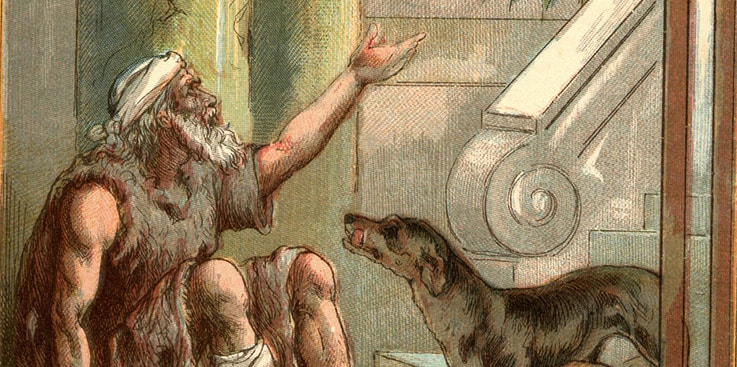 Sermon Sunday November 7, 2021 The Parable of the Rich Man and Lazarus. Luke 16: 19 - 31 In the name of the Father, and of the Son and of the Holy Spirit Today’s date is the 7th November, the 25th of October in the Julian calendar. It is the date of the October Revolution of 1917. Revolutions seem to stand up for the Lazaruses that we’ve just heard about, and against the rich men of this world. However all revolutions inevitably create a hell on earth, where the roles are reversed. Some of the Lazaruses, not that many, become the rich men. And the rich men become beggars, like Lazarus in today’s parable. Paradoxically, we hear from the Holy Fathers that hell, whether here on Earth or in the other dimension, is an expression of God’s love. Elder Ambrose of Optina also says that God does not create your cross. It grows on the soil of your heart. I think the same can be said about hell. We create it. Like the rich man in today’s parable who created a hell on Earth for Lazarus and a hell for himself in the afterlife. One might ask why hell is an expression of God’s love? While we are the ones who create it, God can turn things around and use it for our salvation. Pain transforms us. The rich man in today’s parable begins to think of other people for the first time in his life when he is in hell. That’s a step forward – progress! Wonderful! He thinks of himself first and asks Abraham to relieve his agony, but if that’s not possible, then at least he’s trying to do something for his brothers. Fantastic! I’ve been saying recently that we’ve had it too good for too long. We have been the rich men. Somewhere else millions, tens of millions, maybe hundreds of millions of Lazaruses out of our sight, have toiled like slaves and suffered to enable us to have the affluent lifestyle that we’ve had for decades. Some Lazaruses were even close to us, physically. But we didn’t notice them, like the rich man didn’t notice the Lazarus who was outside of his door. These Lazaruses close to us may not have needed material help, but they needed love. They needed our support, they needed a smile, a warm word, a hug, and we didn’t see that. We were engrossed in our good life, in our comforts. We didn’t want to be disturbed. As you know, I was born in Mao’s China. My grandparents took my parents there as little kids in 1920 – 21, because they didn’t agree with the revolution. My mum was a baby. In the city of Harbin, we had a spiritual elder whose name was Fr Ignati. He was an amazingly gifted man, a spiritually gifted man. He was blind but he would call people by their names as they came up to him. Even those that he’d never met before. One of our parishioners - whom I won’t mention by name in case it slightly embarrasses her although I don’t see anything embarrassing here in retrospect - she came to him as a teenager and would attend the monastery with her family where he lived. And he, the blind man, said to her, “Dear, you should be ashamed of yourself, fancy painting your toenails!”. Now she was wearing shoes, and he’s blind. How on earth did he know that she painted her toenails?! Fr Ignati died in 1958. In the mid – to late 1950s and early 60s most of the people began to leave Manchuria. Before Fr Ignati died, some people that I have known in Sydney came up to him for a blessing to go to Australia. He said, “By all means, God bless you. Go to Australia, but communism will come to Australia too.” So that’s a prophecy of sorts. There are other secular prophets. For instance I mentioned last year to you the book that I bought soon after it was published in May 2020 by a very prominent man in the DAVOS Economic Forum, Klaus Schwab. His book is called Covid 19 and the Great Reset. What is the Great Reset? This year he has been saying sort of a catch phrase By 2030 you won’t own anything and you’ll be happy. That’s another prophesy. Now a number of modern spiritual elders have all said that prophesies are given in order that they are not fulfilled, at least spiritual prophesies. The secret is repentance. Let’s learn from the Ninevites who took Jonah’s words very seriously. The prophet Jonah, in the belly of the whale. Read his book, the story is fascinating. Christ used the image of Jonah as the symbol of His resurrection on the third day. The Ninevites changed their life and survived. They acknowledged God and his values above bread and circuses. That’s a Roman expression, as you know, about the good life and entertainment that people value so much and have always valued throughout all the ages. And bread and circuses are still important in the world. All holy Lazaruses, millions of you, pray for us. Enable us to understand your spirit, so that we know where we’re going spiritually. Archpriest Nicholas Karipoff Bible StudyEvery second Sunday night, from 7pm, led by Father Nicholas Karipoff. To join the email list, contact Costa: costa.pappas2@gmail.com You can catch up with previous sessions on the Pokrov youtube channel. Watch the talk from Sunday Nov 7: https://youtu.be/iuflv37mPWM Trivia Bible Quiz Part 1 – how well do you know Genesis?! 1. In the Creation story what did God make on the 4th day? 1.Birds and fishes 2.Man 3.Light and darkness 4.Animals 2.Eve was tempted and ate what kind of fruit from the tree in the middle of the garden? 1.Apple 2.Orange 3.Banana 4.None of the above 3.Cain and Abel brought sacrifices to the Lord. Whose sacrifice was accepted? 1. Cain 2. Abel 4.How old was Noah when the flood came on the earth? 1.100 years 2.200 years 3.400 years 4.600 years 5. When the flood ceased – on which mountain did the Ark come to rest? 1. Sinai 2. Ararat 3. Tabor 4. Athos 6. How many days was it before Noah opened the window of the Ark to see if the waters had decreased of the earth? 1. 40 2. 150 3. 10 4. 7 7. What did Noah do first when he came out of the Ark? 1. lit a fire 2. saw a rainbow 3. shouted for joy 4. built an altar 8. When God called Abram to leave Haran which direction did he travel? 1. North 2. South 3. East 4. West 9. What is the relationship of Lot to Abram? 1. nephew 2. cousin 3. brother 4. father 10. What is the name of Sarai (Abram’s wife) maidservant? 1. Naomi 2. Rebekah 3. Ruth 4. Hagar (With thanks to Elaine) Answers: 1. 3 - Light and darkness Genesis 1:14-19 2. 4 – none of the above Genesis 3:1-7 3. 2 - Abel Genesis 4:3-8 4. 4 – 600 years Genesis 7:6 5. 2 -Ararat Genesis 8:4 6. 1 – 40 Genesis 8:6 7. 4 – built an altar Genesis 8:20 8. 2 – south Genesis 12:9 9. 1 – nephew Genesis 12:5 10. 4 – Hagar Genesis 16:1 The Nativity of the Mother of God – September 21, 2021
Thy Nativity, O Theotokos Virgin, hath proclaimed joy to all the world; for from thee hath dawned the Sun of Righteousness, Christ our God, annulling the curse and bestowing the blessing, abolishing death and granting us life eternal. In the name of the Father, and of the Son and of the Holy Spirit. The Feast of the Nativity of the Mother of God announces the coming of the joy of salvation into the world. This is what the troparion of the feast talks about. The fullness of this joy comes to fruition with the cross of the Son of the Holy Virgin. One of the stanzas in the Canon, the katavasia that is sung in the next feast of the Exaltation of the Holy Cross, speaks of Aaron’s rod flowering to indicate the eventual fruitfulness of the Old Testament church. Now today’s story of the feast is just as much about Joachim and Anna and the generations that came before them as it about the Mother of God and the joy of her birth which we celebrate today. Stories about transformation through prayer, blooming, becoming fruitful. Today’s world thinks about overcoming Coronavirus, overcoming this virus seems to be the central problem of the world. Now since last year I have mentioned in various ways that there has been a much more serious virus around for much longer – a spiritual virus that is the cause of all our problems including the coronavirus, and everything else that goes with it. I’d like to share something with you, to read you a passage. This passage is one of the first of the great Christian novels by Dostoyevsky, Crime and Punishment. It’s a dream that the central hero, Raskolnikov, has when he is sent for his crime of murder to serve hard labour and he gets very sick during Great Lent. While he experiences high fever he has this dream. Dostoyevsky clearly saw the appearance of the virus - the spiritual virus - which I’ve been talking about since last year. A virus that has led to destruction, to the wars. The First World War was supposed to be the war to end all wars, then on the heels of this war came the Russian Revolution which sparked a whole host of processes; the appearance of other totalitarian regimes later on including Nazi Germany and the Asian communist regimes, the ones in Central, Eastern Europe and so on. So here is the passage: “He dreamt that the whole world was condemned to a terrible new plague that had come to Europe from the depths of Asia. All were to be destroyed except the very few chosen. Some new sorts of microbes were attacking the bodies of men. But these microbes were endowed with intelligence; intelligence and will. Men attacked by them became at once mad and furious, but never have men considered themselves so intellectual and so completely in possession of the truth as these sufferers. Never had they considered their decisions, their scientific conclusions, their moral convictions so infallible. Whole villages, whole towns and peoples went mad from the infection. All were excited and did not understand one another. Each thought that he alone had the truth and was wretched looking at the others, beat himself on the breast, wept and wrung his hands. They did not know how to judge, and could not agree what to consider evil and what good. They did not know whom to blame, whom to justify. Men killed each other in a sort of senseless fight. They gathered together in armies against one another but even on the march the armies would begin attacking each other. The ranks would be broken and the soldiers would fall on each other stabbing and attacking and devouring each other…” I’ll stop there because the dream goes on longer, but I think this is enough of an illustration of what I’ve been trying to convey to you several times since last year about the spiritual process. This is what it is. And today’s Feast teaches us that only transformation through prayer can help. Only God can save us through Christ who speaks about this, and He says that this spiritual virus can only be defeated through prayer and fasting. We actually heard those words quite recently just after the Feast of Holy Transfiguration. So let us increase our prayers and our fasting , which is as I explained on many occasions is not just about a change of diet. Fasting is about control and self-limitation in thought, in word, and in deed. That’s what it’s about. If we do that we will be free of that much more serious and deadly virus, the spiritual virus, and we won’t even worry about many of the other things that seem to be so central in today’s world. Most Holy Mother of God save us with your prayers. Protect us, protect the Church, protect the world. For you are the Mother of the Saviour, to whom is due glory together with the Father and the Holy Spirit, now and ever unto the ages of ages, Amen. Sermon by the Very Rev Father Nicholas Karipoff  The Liturgy of the faithful The first three Pokrov leaflets on the Eucharist introduced the subject and gave brief descriptions of its first two parts: the Preparation and the Liturgy of the catechumens. Now we turn our attention to the last and the most important part, the heart of the Liturgy. For many centuries Christianity formed the cultural backbone of Europe and the New World. In that environment it would have been difficult to understand that the Church and the world have always been different in spirit. The Liturgy preserves a reminder of this in its litany of the catechumens after which they are told to depart. They are still visitors to Church until they die to the world in the waters of Baptism. That death is the door to the Resurrection. The Liturgy of the faithful is a participation in the Resurrection with Christ. Living in a world that was indifferent or hostile to them, the ancient Christians had a developed sense of mystery. They did not want the sacred things close to their hearts to be mocked by the people of the world. “I will not speak of Thy mystery to Thine enemies”, we hear in the prayer of Chrysostom. The mystery truly begins and is stated as such by the Cherubic hymn which the choir starts singing after the petitions for the faithful: “Let us who mystically represent the Cherubim and chant the thrice – holy hymn to the life- creating Trinity, lay aside all earthly cares;” The message is clear. We are in heaven on earth. We must forget – at least for a while – about our earthly cares. The bishop or priest leading the celebration quietly reads a long prayer asking God to enable us to serve Him even though we are unworthy. The deacon censes the altar and the people. With raised hands the priest quietly says the first part of the hymn and the deacon responds with the second part which is sung by the choir after the Great Entry: “That we may receive the King of all Who comes invisibly upborne by the angelic hosts, alleluia, alleluia, alleluia.” The original Greek text and Slavonic translation preserves the image of Roman soldiers raising their general in triumph on a large shield resting on the points of their spears. Christ is the victory–bearing general, and the Great Entry represents Palm Sunday. He enters Jerusalem celebrated as the Victor over death in raising Lazarus. He enters for the last battle, to “trample down death by death.” (On a symbolic level, the Preparation is Christ’s birth and early years; the Small Entry - is the beginning of His ministry). The Great Entry serves to complete the preparation of the elements of bread and wine which are transferred from the Table of Preparation to the Altar Table. Commemoration is also completed with the clergy remembering the hierarchy and the people. The choir sings the second part of the Cherubic hymn. The deacon says the litany of supplication to which we add the petition for the precious Gifts that have been offered. At the end of the litany the priest blesses the people with the words “peace be unto all” and the deacon enjoins the congregation: “Let us love one another that with one mind we may confess”: “The Father and the Son and the Holy Spirit, the Trinity one in essence and undivided” – answers the choir on behalf of the congregation. This is followed by the ancient practice called ‘the kiss of peace’. People would greet their neighbours in Church with the words: “Christ is in our midst”. The responding person would reply: “He is and shall be!” They would exchange paschal kisses. This ancient practice was abandoned many centuries ago because of the commotion it would create in the congregation, and is now done only by the clergy. “The doors, the doors!” reminds the deacon of the ancient practice of guarding the doors against intruders. We could now add: visible and invisible. The congregation (or one person on behalf of all) chants the Symbol of Faith (Nicene Creed): “I believe in one God, the Father Almighty...” During this time, the clergy fan the Gifts with the Aer, a cloth cover, symbolising the breath of the grace of the Holy Spirit. This first part of the Liturgy of the Faithful prepares us for the most important part of the whole Eucharistic liturgy – the Eucharistic canon which we will look at in some detail to bring to completion our series on the Eucharist. At this point the Preparation and commemoration is complete as the Gifts are transferred to the altar table during the Great Entry. The Kiss of Peace and the Symbol of Faith bring about a state of readiness to confess the Holy Trinity “with one mouth and one heart”. In the mystery of the Eucharist we confess our faith in the Unity in Trinity not just in words, but being bonded to each other and to Christ existentially in the image of the Holy Trinity. Archpriest Nicholas Karipoff ЕВХАРИСТИЯ (4) Литургия верных Первые три Покровских листка об Евхаристии дали понятие о теме и описали две первые части: Проскомидию и литургию оглашенных. Сейчас мы обратим наше внимание на последнюю и самую важную часть – сердце Литургии. Многие столетия христианство формировало культурную основу в Европе и в Новом Мире. И в этом отношении очень трудно понять, что Церковь и мир всегда были разные по духу. Литургия сохраняет напоминание об этом в ектении оглашенных, после которой они должны были выйти из храма. Они всё ещё только гости в Церкви до того момента, когда они умрут для мира в водах Крещения. Эта смерть – дверь к воскресению. Литургия верных – участие со Христом в воскресении. Живя в мире, который был равнодушен или враждебен к ним, у древних христиан развилось чувство тайны. Они не хотели, чтобы люди из мира издевались над святынями, близкими их сердцу. «Не скажу врагам Твоим Тайну Твою», - слышим мы молитве Св.Иоанна Златоуста. Тайна действительно начинается и заявляется пением «Херувимской», которую хор начинает петь после ектении верных: «Мы, таинственно изображающие херувимов, и воспевающие Животворящей Троице трисвятую песнь, отложим ныне всякие житейские заботы». Призыв очень ясен. Мы на небесах, находясь на земле. Мы должны забыть – хотя бы на время – всё земное. Епископ или священник тихо читает длинную молитву, испрашивая у Бога разрешение служить Ему, хотя мы не достойны этого. Дьякон кадит алтарь и молящихся. С поднятыми вверх руками священник тихо произносит первую часть гимна, а дьякон отвечает второй частью гимна, которую хор поёт после Великой ектеньи: «Чтобы поднять Царя всех, невидимо копьеносимого чинами ангельскими; Аллилуиа, Аллилуиа, Аллилуиа». Оригинальный греческий текст и церковно-славянский перевод сохранил образ римских воинов, несущих в триумфальном шествии своего генерала, стоящего на щите, поддерживаемом на кончиках поднятых вверх копьях. Христос – победоносный военачальник, и Великий вход изображает Вербное Воскресение. Христос входит в Иерусалим как Победитель над смертью после воскрешения Лазаря. Он входит на последнюю битву, чтобы «смертию смерть попрать». (Символически Проскомидия изображает Рождество Христово и ранние годы жизни; Малый Вход – начало Его земного служения). Великий Вход – заверешение подготовки хлеба и вина, которые переносятся с жертвенника на престол. Поминовение также заканчивается, когда духовенство перечисляет имена иерархов и мирян. Хор поёт вторую часть «Херувимской». Дьякон произносит просительную ектению, к которой добавляется прошение о предлежащих Святых Дарах. После окончания ектении священник благослвляет людей со словами «мир всем», и дьякон присоединяется словами: «Возлюбим друг друга, да исповедуем в единомыслии»; хор отвечат от лица всех молящихся: «Отца, и Сына, и Святого Духа; Троицу единосущную и нераздельную». После этого следует так называемая древняя практика «целование мира». Раньше люди в храме подходили друг к другу со словами: «Христос посреди нас!» и слышали в ответ: «Есть и будет!». И обменивались поцелуем. Эта древняя практика была отменена много веков назад, потому что это нарушало порядок в храме. Сейчас это совершается только в алтаре среди духовенства. «Двери, двери!», - напоминает дьякон о древней практике охраны дверей против злоумышленников. Сейчас мы ещё добавляем: «видимых и невидимых». Молящиеся или один от их лица поют/читает Символ Веры: «Верую во единого Бога, Отца, Вседержителя...». В это время духовенство веет покровом (символизирует дыхание Святого Духа) над Святыми Дарами. Эта первая часть Литургии верных подготавливает нас к наиболее важной части всей Евхаристии – к Евхаристическому канону, который мы рассмотрим подробнее, приводя к завершению нашу серию об Евхаристии. На данный момент закончена Проскомидия и Поминовение, когда Святые Дары перенесены на престол во время Великого входа. «Целование мира» и Символ веры подвели к готовности исповедывать Святую Троицу «едиными устами и единым сердцем». Тайна Евхаристии – это когда мы исповедуем нашу веру в Единицу в Троице не только на словах, но и в жизни, будучи связанными друг с другом и со Христом по образу Святой Троицы. Прот.Николай Карыпов 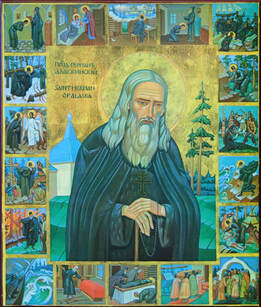 Epistle of Metropolitan Hilarion on the Occasion of the 50th Anniversary of the Glorification of Venerable Herman, Wonderworker of Alaska Right reverend brother-archpastors, reverend fathers, beloved brothers and sisters in the Lord! Pushkin’s chronicler Pimen, passing on his life’s work to his student, said: "…To thee I hand my task. In hours exempt From the soul’s exercise, do thou record, Not subtly reasoning, all things whereto Thou shalt in life be witness; war and peace, The sway of kings, the holy miracles Of saints, all prophecies and heavenly signs; ? For me ‘tis time to rest and quench my lamp…" "Here is that which is most dear to the Russian people: the holy miracles of saints, prophecies, and heavenly signs. And truly, no celebration in Russia ever saw the coming together of such multitudes in Russia as the opening of new holy relics," said Metropolitan Anthony (Khrapovitsky), who 100 years ago led the Russian Church Abroad, in one of his sermons. As we know, the stages of the glorification of a saint in Christ’s Church take place gradually. We, the archpastors, pastors, and flock, examine ourselves against the dispositions of our forebears in the Faith, and in this way the canonization of God’s saints matures and takes shape. The discussions relating to the glorification by the Church of Venerable Herman of Alaska first took place at the Council of Bishops in 1939, which was held in the cradle of the Russian Church’s diasporan wing in Sremski Karlovci. When a report on this subject by His Grace Alexis, Bishop of the Aleutians & Alaska, was being discussed, the Holy Hierarch Seraphim (Sobolev) expressed his confidence that the glorification of the Elder Herman, accomplished in the Diaspora, would undoubtedly be confirmed by the Mother Church; the other fathers at this Council, meanwhile, led by Metropolitan Anastassy (Gribranovsky), though expressing their general belief in the God-pleasing nature of the works and ascetic labors of Venerable Herman, considered it necessary to wait for a restoration of normalcy in the life of the persecuted Russian Orthodox Church. The Most Blessed Metropolitan Anastassy maintained this position in other instances, as well. When, for instance, the question of the glorification by the Church of the Righteous John of Kronstadt was raised in 1953, Metropolitan Anastassy expressed his reservations regarding the canonical basis for doing so, saying that "the sole basis on which we operate is directive №362 of His Holiness, Patriarch Tikhon, which allows us to perform the functions of ongoing Church life, but does not grant us the right to perform such exceptional acts as the glorification of saints." Nevertheless, in 1964, still during the lifetime and with the consent of the retired Metropolitan Anastassy, the Council of Bishops, having unanimously elected Metropolitan Philaret (Voznesensky), glorified the Righteous John for the consolation of the People of God living in difficult circumstances abroad, and for the strengthening of the Mother Church, which was suffering at the hands of godless persecutors. At the time, many considered this bold step by the Russian Church Abroad to be one of the spiritual fruits of the entire Russian Orthodox Church, which led to the end of the so-called "Khrushchev’s persecutions." Confidants of the departed Patriarch Pimen (Izvekov) reported that he secretly performed the service to the Pastor of Kronstadt in his residence, according to the rite adopted by the Russian Church Abroad; Metropolitan Nikodim (Rotov), the spiritual preceptor of the current Patriarch, His Holiness Kyrill, personally thanked our parishioners for this glorification when they had a rare opportunity in those days to visit the City on the Neva. At that same time in the Western American Diocese, the Holy Hierarch John (Maximovitch), the greatest of the masterminds behind the glorification of the Righteous John, in which he was supported by the renowned hierarch and "Serbian Chrysostom" Nicholas (Velimirovic), always celebrated the feast day of Venerable Herman. On the feast day of Venerable Sergius and Herman of Valaam, and on December 13/26, the traditional date believed to be the day of Elder Herman’s repose, and later, as determined by the results of further investigations, the day of his burial. Saint John would serve a panihida after Divine Liturgy, which would end with the singing of the magnification for monastic saints. Taking pious part in these divine services was Eugene Rose, the future Hieromonk Seraphim, who received monastic tonsure on the feast of the Protection of the Most Holy Theotokos in 1970 at the hands of the gracious and loving Archbishop Anthony (Medvedev), the Holy Hierarch John’s successor. Archbishop Anthony, like Saint John before him, who adhered to the monastic school of Metropolitan Anthony (Khrapovitsky), labored much in the preparations for the glorification by the Church of the Elder Herman, the Righteous John, and his own predecessor in the See of San Francisco, as well as the Synaxis of New Martyrs and Confessors of the 20th century. In the case of the glorification of the Wonderworker of Alaska, great effort was also expended by the above-mentioned Hieromonk Seraphim, along with the abbot and brethren of Saint Herman of Alaska Monastery, at that time a part of the Western American Diocese of the Russian Church Abroad, who published articles about the saint and a multitude of testimonies regarding the miraculous help rendered by the Missionary Elder, in Russian in the "Orthodox Herald" (Православный благовстникъ) and in English in the "Orthodox Word." At the celebrations of the glorification of Venerable Herman in Joy of All Who Sorrow Diocesan Cathedral in San Francisco in 1970, organized beautifully and in good order by Archbishop Anthony, in accordance with the recommendations of His Grace, Bishop Alexis, from the above-mentioned 1939 report, Metropolitan Philaret presented Reader Eugene Rose and his collaborators with benedictory certificates for their labors. We know of an incident that took place in 1842 with the Holy Equal-of-the-Apostles Innocent, future Metropolitan of Moscow & Kolomna, printed on the last page of a brochure published in prerevolutionary Saint Petersburg, entitled "The Life of the Valaam Monk Herman: An American Missionary." Sailing at the time across the sea to Kodiak Island and finding himself in danger, the Holy Hierarch Innocent, looking toward Spruce Island (the burial place of Elder Herman), turned to him in his thoughts and said, "If thou, O Elder Herman, wast pleasing to God, then let the wind change." Very soon, the wind became favorable, and safely carried the archpastor to shore, after which, in thanks to Venerable Herman for delivering him, he served a panihida. Let us also pray to these giants of Orthodoxy in America, that the Lord might preserve the ship of our Church in this complicated time, making us worthy of that for which our forebears labored and which they created! Amen. Asking your holy prayers, I remain in the love of the Lord, +HILARION Metropolitan of Eastern America & New York First Hierarch of the Russian Church Abroad July 27/August 9, 2020 50th Anniversary of the Glorification of Venerable Herman of Alaska ПОСЛАНИЕ митрополита Восточно-Американского и Нью-Йоркского ИЛАРИОНА, Первоиерархра Русской Зарубежной Церкви, по случаю 50-летия прославления преподобного Германа, Аляскинского чудотворца. Преосвященные собратья-архипастыри, всечестные отцы, возлюбленные о Господе братья и сестры! Пушкинский летописец Пимен, передавая свой труд своему ученику, говорил: «...Тебе свой труд передаю. В часы, свободные от подвигов духовных, описывай, не мудруствуя лукаво, все то, чему свидетель будешь: войну и мир, управу государей, угодников святые чудеса, пророчества и знамения небесны, а мне пора, пора уж отдохнуть и погасить лампаду...» «Вот, что наиболее дорого русскому народу – угодников святые чудеса, пророчества и знамения небесны. И действительно, ни на одно торжество не собиралось в России такого множества народа, как на открытия новых святых мощей» – сказал в одной из своих проповедей митрополит Антоний (Храповицкий), 100 лет тому назад возглавивший Русскую Зарубежную Церковь. Как известно, сроки прославления святых вынашиваются в Христовой Церкви постепенно. Мы, архипастыри, пастыри и пасомые, проверяем себя настроениями наших предшественников по вере и так созревает канонизация угодников Божиих. Суждение о церковном прославлении преподобного Германа Аляскинского впервые имело место на Архиерейском Соборе 1939 года, прошедшем в колыбели заграничной части Русской Церкви – в Сремских Карловцах. Когда обсуждался доклад по этой теме Преосвященного Алексия, епископа Алеутского и Аляскинского, святитель Серафим (Соболев) выразил уверенность, что прославление старца Германа, совершенное за границей, несомненно будет утверждена Матерью-Церковью, а прочие отцы этого Собора во главе с митрополитом Анастасием (Грибановским), выражая общее убеждение в богоугодности трудов и подвигов преподобного Германа, полагали необходимым выжидать восстановления нормального течения жизни гонимой Русской Православной Церкви. Подобной позиции Блаженнейший владыка Анастасий придерживался и в других случаях. Когда, например, поднимался вопрос о церковном прославлении праведного Иоанна Кронштадтского в 1953 году, митрополит Анастасий выражал сомнения в канонических основаниях для его совершения, говоря, что «единственное основание, на котором мы утверждаемся, – это указ Святейшего Патриарха Тихона за № 362, который предусматривает осуществление нами функций текущей церковной жизни, но не дает нам прав на совершение таких исключительных актов как прославление святых». Тем не менее, в 1964 году, еще при жизни и с согласия ушедшего на покой митрополита Анастасия, Архиерейский Собор, единогласно избравший митрополита Филарета (Вознесенского), прославил праведного Иоанна для утешения Народа Божия, оказавшегося в сложных заграничных условиях, и укрепления Матери-Церкви, страдавшей от безбожных гонителей. Тогда многие считали этот дерзновенный шаг Русской Зарубежной Церкви одним из духовных плодов всей Русской Православной Церкви, приведших к окончанию так называемых «Хрущевских гонений». Известно от ближайшего окружения покойного Патриарха Пимена (Извекова), что он в своей резиденции тайно совершал службу Кронштадтскому пастырю по чинопоследованию, принятому в Русской Зарубежной Церкви, а митрополит Никодим (Ротов), духовный наставник ныне здравствующего Святейшего Патриарха Кирилла, лично благодарил за это прославление наших прихожан, имевших тогда редкую возможность посещать город на Неве. В это же время святитель Иоанн (Максимович), самый великий из вдохновителей прославления праведного Иоанна, поддержанный на этом пути знаменитым святителем и «Сербским Златоустом» Николаем (Велимировичем), будучи на Западно-Американской кафедре, всегда торжественно отмечал дни памяти преподобного Германа. В праздник преподобных Сергия и Германа Валаамских и 13/26 декабря – в традиционную дату, считавшуюся тогда днем преставления старца Германа, а потом, как выяснилось из материалов новых исследований, оказавшуюся днем его погребения – святитель Иоанн после Божественной литургии совершал панихиду, которая заканчивалась пением преподобнического величания. В этих богослужениях всегда с благоговением участвовал Евгений Роуз, будущий иеромонах Серафим, принявший монашеский постриг в праздник Покрова Пресвятой Богородицы в 1970 году от рук любвеобильного и благостного преемника святителя Иоанна – архиепископа Антония (Медведева). Последний, как и сам святитель Иоанн, относившийся к монашеской школе митрополита Антония (Храповицкого), много потрудился в подготовке церковных прославлений как старца Германа, праведного Иоанна и своего великого предшественника по Сан-Францисской кафедре, так и Собора новомучеников и исповедников ХХ века. В деле прославления Аляскинского чудотворца много приложил усилий и вышеупомянутый иеромонах Серафим с игуменом и братией Германовской Пустыни, состоявшей тогда в Западно-Американской епархии Русской Зарубежной Церкви, выпуская о нем статьи и многочисленные свидетельства о чудесной помощи старца-миссионера в «Православном благовестнике» на русском языке и в «Православном слове» (Orthodox Word) – на английском. На торжествах прославления преподобного Германа в Радосте-Скорбященском кафедральном соборе г. Сан-Франциско в 1970 году, благообразно и чинно обставленных архиепископом Антонием, согласно предложениям Преосвященного Алексия из вышеуказанного доклада от 1939 года, митрополит Филарет вручил чтецу Евгению Роуз и его сподвижникам благословенные грамоты за эти труды. Известен случай, произошедший в 1842 году с равноапостольным Иннокентием, будущим митрополитом Московским и Коломенским, приводимый на последней странице, изданной в дореволюционном Санкт-Петербурге, брошюры «Жизнь Валаамского монаха Германа, Американского миссионера». Тогда, плывя морем в Кодьяк и оказавшись в опасности, святитель Иннокентий, взирая на Еловый остров – место погребения старца Германа, мысленно обратился к нему, сказав: «если ты, отец Герман, угодил Господу, то пусть переменится ветер». Вскоре после этого ветер стал попутным, благополучно доставив архипастыря до берега, после чего, в благодарность преподобному Герману за избавление, он совершил панихиду. Помолимся и мы этим гигантам Православия в Америке, чтобы Господь сохранил наш церковный корабль в сие непростое время, соделав нас достойными того, о чем подизались и чего создавали наши предшественники! Аминь. Испрашивая святых молитв, остаюсь с любовью о Господе, + ИЛАРИОН, Митрополит Восточно-Американский и Нью-Йоркский, Первоиерарх Русской Зарубежной Церкви. 27 июля/9 августа 2020 г. 50-летие прославления преподобного Германа Аляскинского Please join Father Stephen (Saint John the Baptist Cathedral, Canberra) and our parish priests, Father Nicholas Karipoff and Father Nicholas Dalinkiewicz for Faith&Wisdom: Family Edition.
This panel of fathers have many years of experience in dealing with married couples and will be speaking to us about the common problems that marriages face, the causes for such problems and how we can resolve these problems in loving and Christian manner. Here are the details for the event: Date: 9 August 2020 Time: 7.30pm Zoom link :https://us02web.zoom.us/j/6874461401 The facebook event can be found on the St John the Baptist Facebook page: https://www.facebook.com/events/2326055041023064/
QUICK INFO GUIDE Donations / Candle kiosk Please support your church at this difficult time. You can purchase candles or make a donation at our online store. Theology classes We are now live-streaming theology classes every second Sunday at 7pm. Please subscribe to our YouTube channel and the Pokrov newsletter for up to date information. 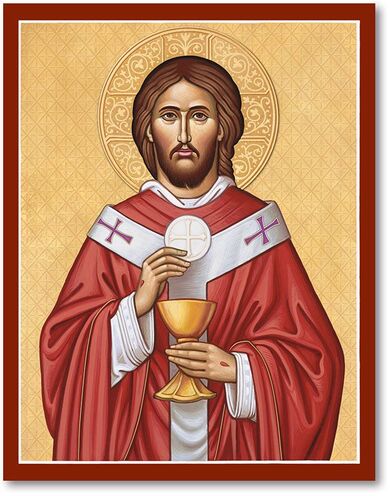 THE EUCHARIST (3) The previous Pokrov Leaflet described the preparatory part of the Eucharistic liturgy known as ‘proskomede’ (aka ‘prothesis’, preparation) performed by the clergy. Now we need to describe the other two parts of the liturgy conducted in the presence of the congregation. The hours A Sunday or festal liturgy in the Russian Church is typically preceded by the reading of the hours (3 & 6). These have a very ancient history, going back to the practice of ancient Israelites of praying three times a day: in the morning, at midday and in the evening. The early Christians at first followed this practice, which gradually formed into 3rd, 6th and 9th hours, according to important events of the New Testament that happened at those times, including Pentecost, the Crucifixion, and the death of the Saviour. (Later 1st hour was added after the morning service (matins) to remember the judgement of Christ by the Council of elders). At the 6th hour the clergy complete the preparation and the deacon (or priest, if serving without a deacon) censes the altar and the whole Church. Censing signifies connection in prayer and grace, as icons and people are censed. Now the Church on Earth connected to Heaven prepares for Heaven on Earth – the Eucharist. The Liturgy of the Catechumens “Blessed is the Kingdom of the Father, and of the Son, and of the Holy Spirit..” this exclamation reminds us of what the liturgy is about: the experience of God’s Kingdom, the Church as a miracle of love in Christ in a world filled with hate, mistrust, competition, aggression and separation/alienation of brothers and sisters. What follows this exclamation is a rather long list of petitions to which the choir responds on behalf of the congregation: “Lord, have mercy!” It is possible for the whole congregation to participate in the responses. The effect is not as harmonious but more powerful. (We will have to try it). If we are not in the choir, we should nevertheless say the responses mentally. This way we will be participating actively, not just listening passively. The litany of peace (“In peace, let us pray to the Lord”) has a very long history, as it is described in 3rd century Christian writings. With the priest’s exclamation at the end of the litany, the choir begins to sing the antiphons. This refers to the ancient practice of singing with two choirs which has survived mainly in monasteries. Antiphons are either psalms or select verses from the psalms on feasts of the Lord. Two antiphons are followed by small litanies (“Again and again..”) and small entry with the Gospel occurs during the third antiphon. Usually, the Beatitudes from the beginning of Ch.5 in Matthew’s Gospel are sing here, unless it is a great feast of the Lord, when single verses from the psalms are followed by the repeated singing of the troparion (the major hymn) of the feast. In ancient practice there was a practical reason for this procession (‘small entry’) when clergy and altar servers brought the Gospel from a strong room in the body of the Church. As books were copied by hand until around 1500 AD, they were very expensive. Now this entry has mainly a symbolic meaning of Christ’s entry to His ministry. The Gospel now is kept on the altar table itself. The choir now begins to sing troparia (composed hymns) for the feast or the day, say a great feast or Sunday, or a saint celebrated on that day. Some of these troparia are called ‘kontakions’, found in the matins canons of these occasions. While most of the liturgy remains unchanged these hymns and the readings which come a little later are ‘changeable’ parts. They depend on the day, the occasion and there is much variety there, as these elements give specific meaning to each day. After an exclamation from the priest the choir begins to sing the ‘thrice holy hymn’: Holy God, Holy Mighty, Holy Immortal have mercy on us. This trinitarian doxology (glorification) prepares us for the reading of Scripture – the Word of God. The reader comes out of the sanctuary and announces the ‘prokimenon’, a verse connected thematically with the event and the reading for it. The choir sings the prokimenon three times. The reader announces the source of the reading from the Acts or from an Epistle, an apostolic letter. On finishing he (or she) announces the alleluia and its verses with the choir singing alleluia thrice. ‘Alleluia’ is a triumphant exclamation: praise the Lord! It is the prokimenon for the Gospel reading and the deacon prepares by censing the Gospel on the altar, the sanctuary and the people. In modern practice the deacon begins this during the reading of the Epistle as the alleluia is not sung as slowly as in the earlier centuries. The Church has a system of Scripture readings called ‘the lectionary’. The Epistle and the Gospel are read according to that annual timetable. There are readings for the day, say Sunday, and there are special readings for feasts and Saint’s days. The early Church had a different lectionary beginning with Old Testament Scripture, then the Gospel followed by the Epistle after which the Bishop or the Presbyter would say a homily, explaining these readings. In modern practice Old Testament passages are generally read at vespers. According to tradition it was St John Chrysostom who moved the sermon (homily) to the end of the service to prevent people from leaving the liturgy after having listened to his sermon. The more ancient practice lives on in some places. The sermon connects easier with the readings that people had just heard. More litanies complete the first public part of the liturgy, known as the Liturgy of the Catechumens. First, the litany of fervent supplication (aka ‘augmented litany’) is said, called thus because of the triple ‘Lord have mercy’ response. The Slavonic name for this litany – ‘doubled’ preserves the memory of the more ancient practice of singing ‘Lord have mercy’ here – twice, as well as the ‘alleluia’. The petitions here are similar to the petition of the litany of peace, but there is the option of inserting additional petitions, e.g. for the sick, the travelers and others. This augmented litany may be followed by an augmented litany for the departed, but normally not on Sundays or festal occasions. The Church now prays for the catechumens in a special litany and prayer said by the priest ‘mystically’ i.e. quietly. These quiet prayers accompany almost all the litanies of the liturgy, beginning with the first. The early Church said everything aloud, but on the other hand the general public was not admitted to the Eucharistic service. This reflects the attitude of great reverence that the Church has for God’s mystery. Having said prayers for the catechumens here, the congregation would dismiss them, because only the faithful (baptized Christians) could stay for the main Eucharistic section and to receive Holy Communion. Thus, we hear even now: “Catechumens, depart!” The deacon continues with the litany of the faithful that brings to completion this section of the liturgy. The Cherubic hymn opens the liturgy of the faithful. The first public section of the liturgy serves to prepare the congregation for the most important part – the bloodless sacrifice. The ancient Church had absorbed much from the tradition of ancient Israel. The Liturgy of the Catechumens reflects the instruction and edification of the Synagogue; the Liturgy of the Faithful reflects the sacrificial aspect of the Temple. Archpriest Nicholas Karipoff ЕВХАРИСТИЯ (3) В предыдущем Покровском листке говорилось о подготовительной части Евхаристической литургии, называемой «проскомидия» (подготовка). Теперь нам нужно описать две другие части литургии, происходящие уже в присутствии молящихся. Часы Воскресная или праздничная литургия в Русской Церкви начинается с чтения часов (3 и 6). Это имеет очень древнюю историю, уходящую назад к практике древних израильтян, которые молились три раза в день: утром, днём и вечером. Вначале древние христиане следовали этой практике, которая со временем преобразовалась в 3-ий, 6-ой и 9-ый часы – соответственно важным событиям Нового Завета, которые происходили в эти часы, включая Пятидесятницу, распятие и смерть Спасителя. (Позднее был добавлен 1-ый час после утренней службы (Утрени) в память суда над Христом Советом старцев). Во время чтения 6-го часа духовенство заканчивает проскомидию, и дьякон (или священник, если служит без дьякона) кадит алтарь и весь храм. Каждение икон и людей означает связь в молитве и благодати. Теперь Церковь Земная связана с Небесной и готова для Неба на Земли – Евхаристии. Литургия оглашенных «Благословенно Царство Отца, и Сына, и Святого Духа» напоминает нам, что такое литургия: переживание Царствия Божия, Церкви – как чуда любви во Христе в мире, наполненном ненавистью, недоверием, конкуренцией, агрессией, разделением/отчуждением между братьями и сёстрами. За этим возгласом следует перечень прошений, на которые хор отвечает от лица присутствующих словами: «Господи, помилуй». Все люди в храме могли бы участвовать (эффект был бы не таким гармоничным, но более мощным). Если мы не в хоре, всё равно про себя должны отвечать – таким образом мы будем активно участововать, а не слушать пассивно. Мирная ектения («Миром (т.е в мире), Господу помолимся») известна ещё из христианских писаний III века. После возгласа священника в конце ектении хор начинает петь антифоны. Это тоже пришло из древней практики, когда пели на два хора, что сохранилось в основном только в монастырях. Антифоны – это псалмы или отдельные фразы из псалмов на Господские праздники. После пения двух антифонов следует малая ектения («Паки и паки...», т.е. опять и опять) и малый вход с Евангелием в руках во время пения 3-го антифона («блаженны»). Обычно это слова из начала 5-ой главы Евангелия от Матфея, но если случится великий Господский праздник, тогда после отдельных фраз из псалмов хор повторяет пение тропаря праздника. В древности существовала практическая причина для этой процессии («малого входа»), когда духовенство и алтарные прислужники выносили Евангелие из церковного хранилища, т.к. копии книг в те времена писались от руки (приблизительно до 1500 года по Рождестве Христовом) и стоили очень дорого. Сейчас этот вход имеет чисто символическое значение – начало земного служения Иисуса Христа. Евангелие сейчас оставляется на престоле. Хор начинает пение тропарей (сочинённых гимнов) празднику или дню: великому празднику или воскресенью; или празднуемому святому. Некоторые из них называются «кондаки», находящиеся в тексте канонов на утрени этих дней. В то время, как большая часть текста литургии не меняется, эти тропари и последующие чтения - изменяемые части. Это зависит от дня, какой праздник или святой празднуется – много вариантов, придающих специальный оттенок каждому дню. После возгласа священника хор начинает петь тройное «Святый Боже»: Святый Боже, Святый Крепкий, Святый Бессмертный, помилуй нас. Тройное прославление готовит нас к чтению Писания – Слова Божия. Чтец выходит на середину храма из алтаря и произносит «прокимен» - стихи, которые тематически связаны с событием и чтением для него. Хор поёт прокимен 3 раза. Чтец провозглашает источник чтения (из Деяний или посланий апостольских). По окончании чтения, он (или она) произносит «Аллилуйя» и стихи, а хор поёт «Аллилуйя» трижды. Слово «аллилуйя» означает победное возклицание – «хвалите Бога!» Это является прокимном для Евангельского чтения, которое дьякон подготавливает каждением Евангелия в алтаре, самого алтаря и людей. В современной практике дьякон обычно начинает каждение во время чтения Апостола, т.к. «аллилуйя» не поётся так медленно, как в древние времена. В Церкви существует порядок чтений Священного писания. Апостол и Евангелие читаются в соответствии с годовым расписанием: чтения дню (например, воскресенью), специальные чтения праздникам и святым. Древняя Церковь имела другое расписание, которое начиналось с чтений из Ветхого Завета, затем Евангелие и Апостол, после чего епископ или священник говорил проповедь, объясняя эти чтения. В современной практике чтения из Ветхого Завета в основном читаются на вечерне. Согласно традиции, Иоанн Златоуст передвинул проповедь на окончание литургии, чтобы люди не покидали храм, прослушав его проповедь. Но древняя практика сохранилась в некоторых местах. Проповедь легче соединяется с только что прочитанными текстами. Несколько прошений заканчивают первую в присутствии молящихся часть литургии - литургии оглашенных. Сначала идёт ектения сугубая (удвоенная ектения), называемая так, потому что в ответ поётся утроенное «Господи, помилуй»). (Славянское название «сугубая» сохраняет память более древней практики, когда «Господи, помилуй» в этом месте пелось дважды, так же как «аллилуйя» до этого). Прошения здесь сходны с прошениями на мирной ектении, но здесь есть возможность вставить дополнительные прошения: о болящих, о путешествующих и т.д. После сугубой ектении также может следовать сугубая ектения за умерших, но обычно это не делается в воскресные или праздничные дни. Затем Церковь молится за оглашенных в специальной ектении и молитве, произносимой «тайно», т.е. тихо, священником в алтаре. Эти тайные молитвы читаюся священником в алтаре одновременно с ектениями литургии, начиная с первой. В древности всё произносилось вслух, но с другой стороны, но не все люди могли присутствовать на Евхаристической службе. Это отражает великое благоговение Церкви к Таинству Божьему. Помолясь об оглашенных, молящиеся отпускали их, потому что только «верные» (т.е. крещённые христиане) могли присутствовать на главной части Евхаристии и получать Святое причастие. Мы до сих пор слышим: «Оглашенные, выйдите!» Дьякон продожает ектению для верных, что является заключением этой части литургии. С пением «Херувимской» начинается литургия верных. Первая часть общественной литургии готовит молящихся к наиболее важной части – безкровной жертве. Древняя Церковь впитала многое из традиций древнего Израиля. Литургия оглашенных отражает назидания синагоги; литургия верных отражает храмовой жертвенный аспект. Протоиерей Николай Карыпов Nominations are now open for 7 Parish Council positions:
Treasurer, Secretary and 5 ordinary members Nominations are also open for the Parish auditing committee (3 members required). All nominations will close at 5pm on Sunday 13 September. Elections (if required) will be held at the AGM on 4 October. NOMINATION FORM 10 июля 2020 г.
Так же открыты предложения на позиции 3-ёх членов Ревизионной комиссии. Все предложения будут приниматься до 5-ти часов вечера 13-ого сентября 2020 г. Выборы (если потребуется) пройдут на Общем годовом собрании членов прихода, намеченном на 4-ое октября 2020 г. ФОРМА ДЛЯ ПРЕДЛОЖЕНИЙ |
Location |
|

